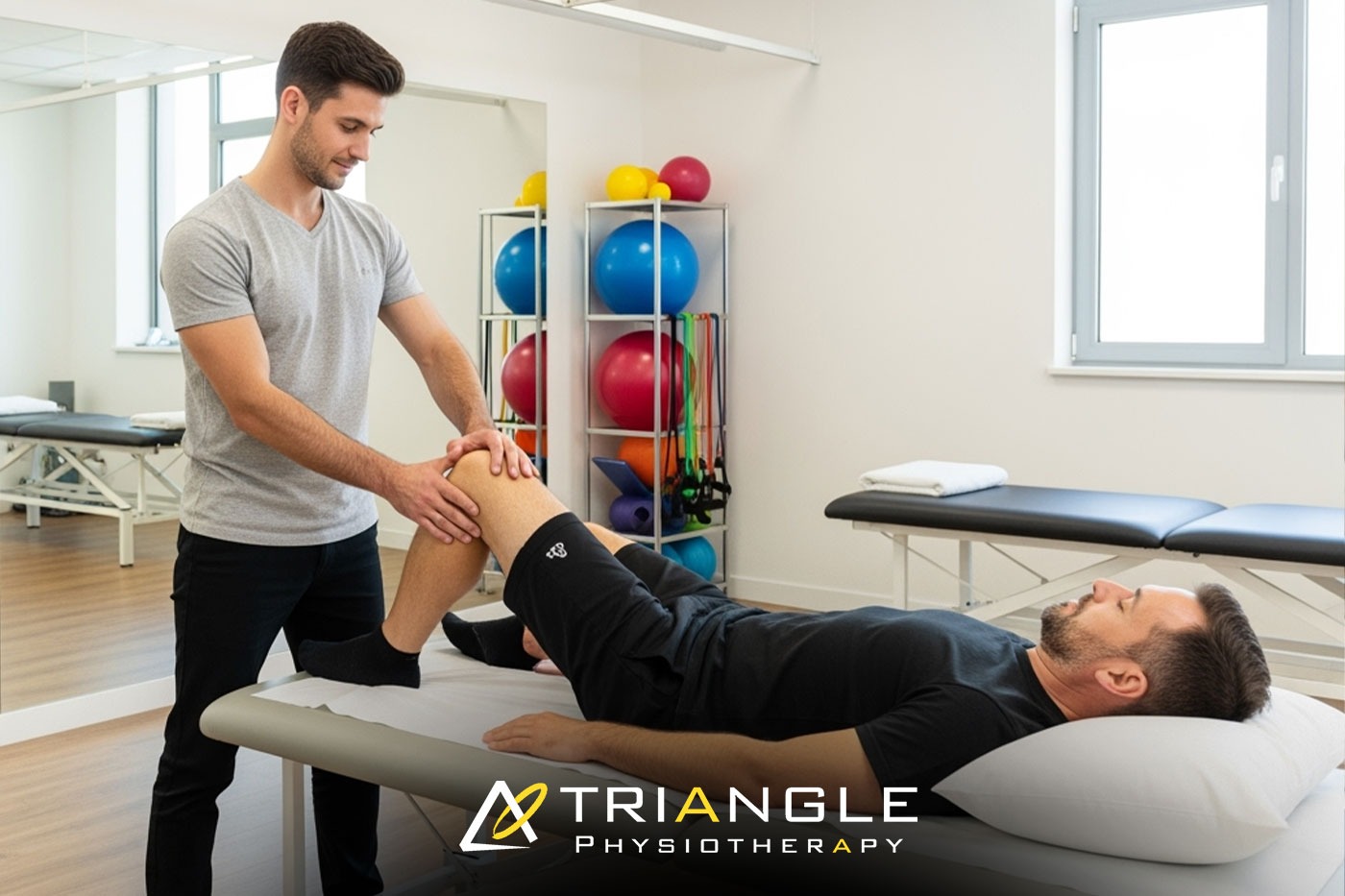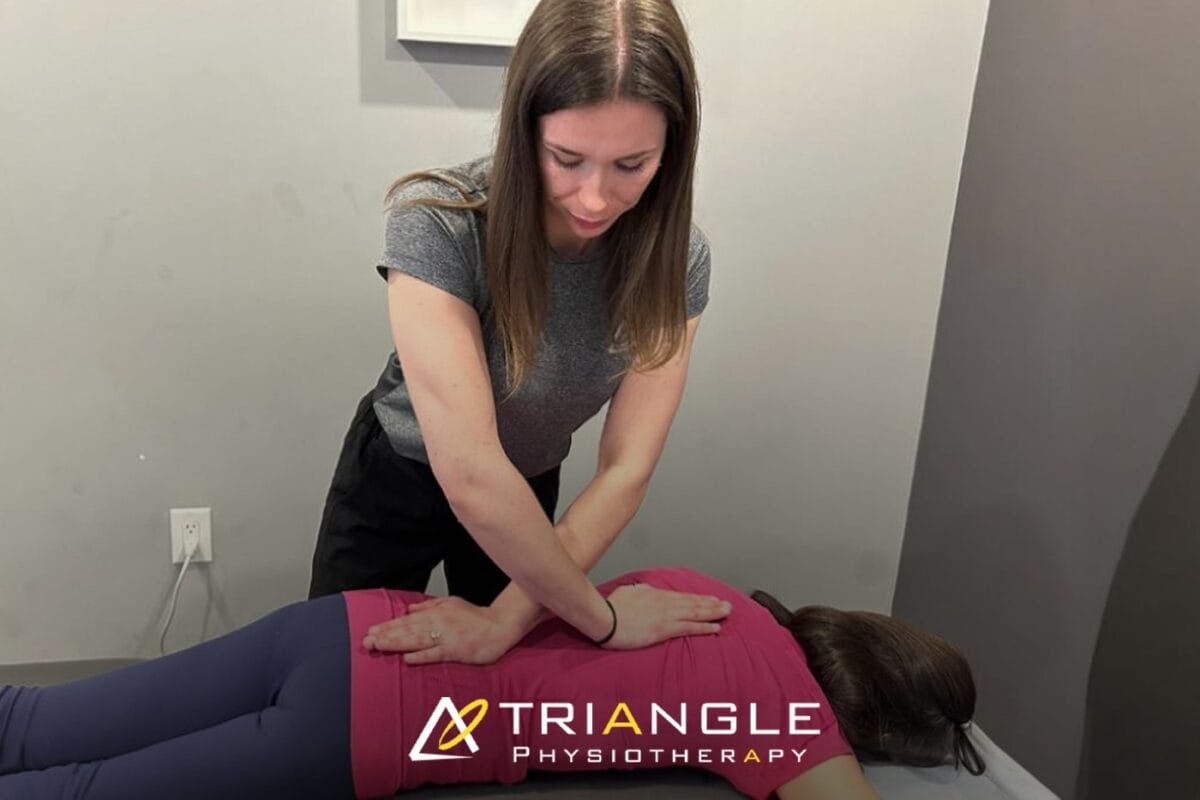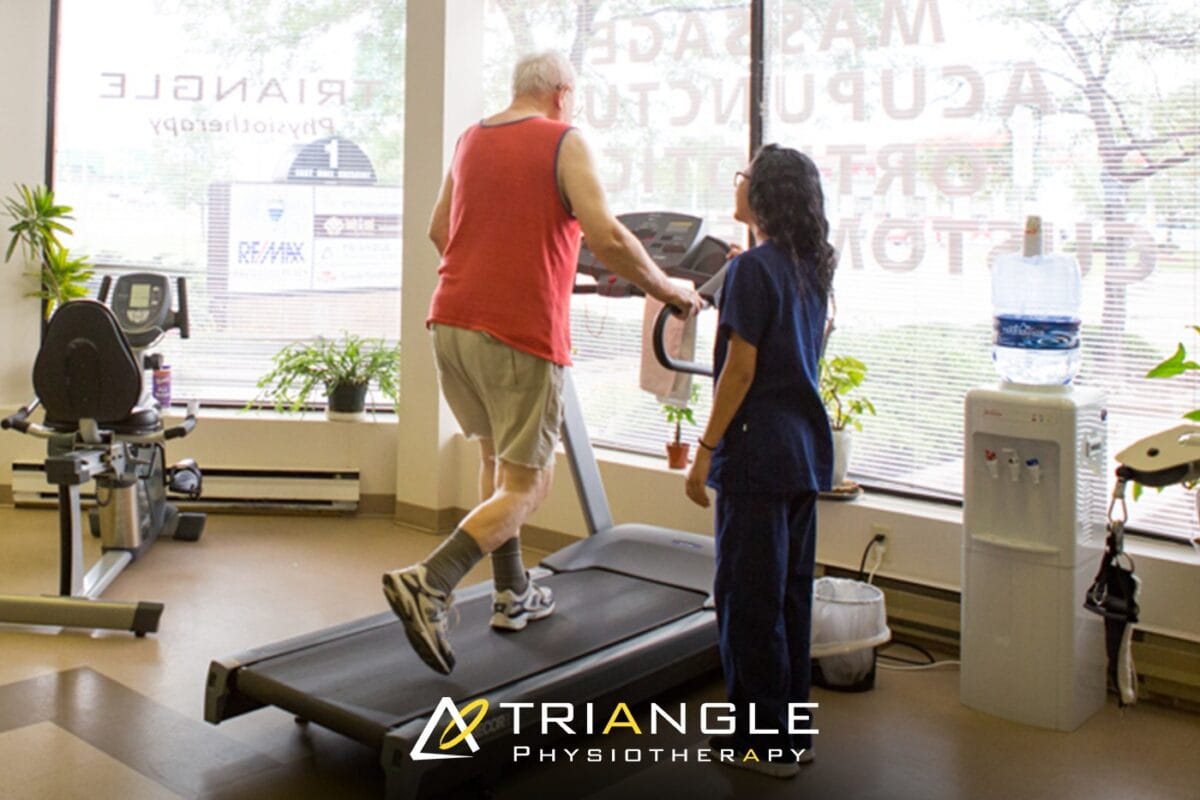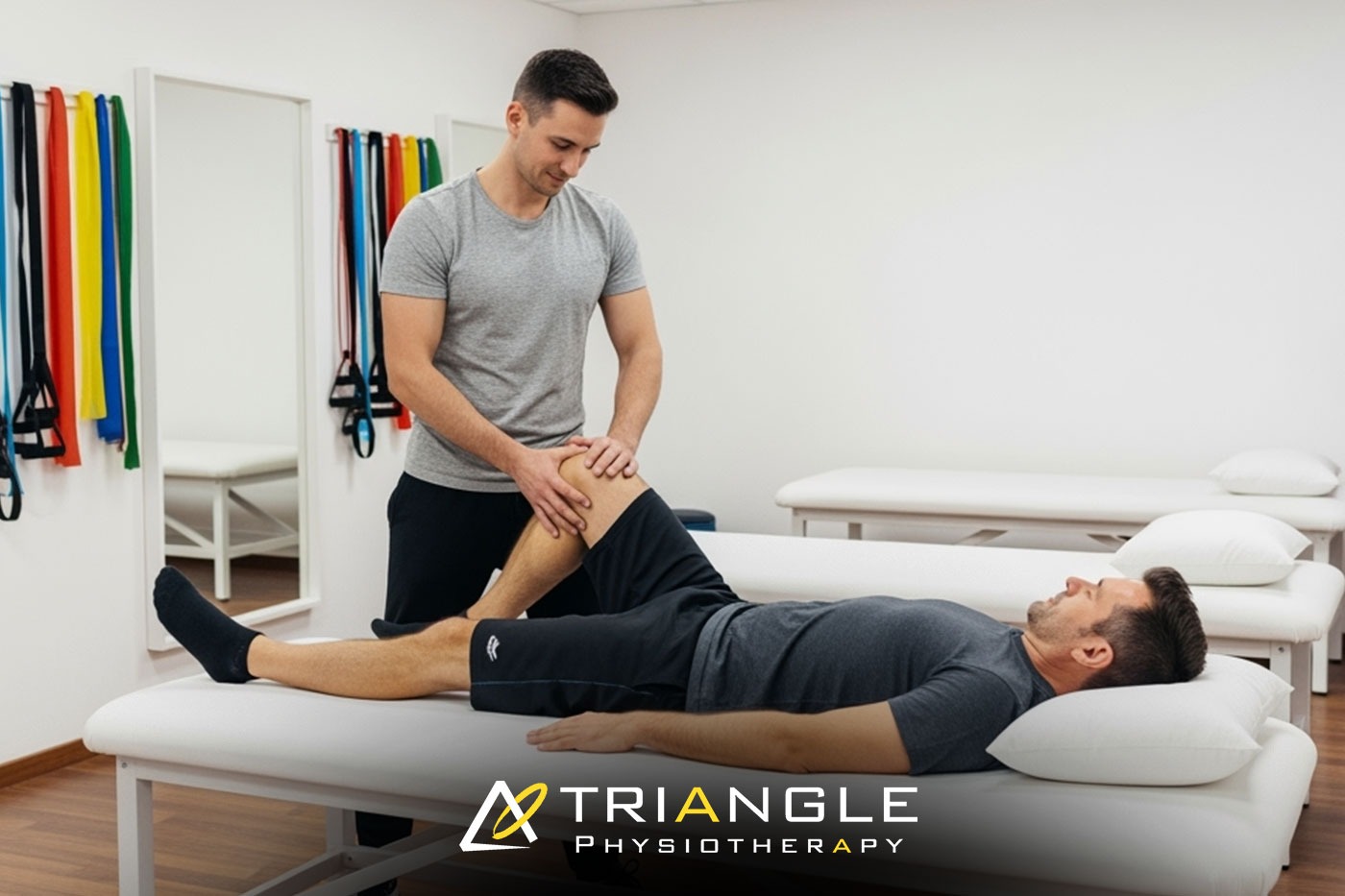Athletes push their bodies hard – every sprint, every rep, every game. But sometimes, the most challenging injuries are the ones you don’t see coming. Hairline fractures – also called stress fractures – can creep in quietly and sideline even the most elite performers.
If you’re searching for sports physiotherapy near me after a stress injury, or want to prevent future setbacks, this guide is for you.
At Triangle Physiotherapy, we understand the athlete’s mindset – and we’re here to get you back in the game, stronger than before.
What Is a Hairline Fracture?
Hairline fractures are tiny cracks in the bone, often caused by repetitive stress rather than a single traumatic event. They commonly affect:
- Runners (shins, feet)
- Basketball or soccer players (lower legs, hips)
- Gymnasts or dancers (feet, spine)
Unlike acute injuries, stress fractures develop over time – especially when there’s overtraining, poor biomechanics, or inadequate recovery.
Common Signs of a Stress Fracture in Athletes
- Localized pain that worsens with activity
- Pain that subsides with rest but returns with exertion
- Swelling or tenderness at a specific site
- In some cases, minor bruising
If you’re brushing off a nagging pain thinking it’s “just soreness,” stop. Early intervention is key.
The Role of Physiotherapy in Hairline Fracture Recovery

At Triangle Physiotherapy, our sports rehab specialists build a plan that supports bone healing, protects your performance, and prevents re-injury.
Here’s how we approach it:
- Acute Phase: Protect + Heal
- Rehabilitation Phase: Rebuild + Strengthen
- Return-to-Sport Phase: Retrain + Prevent
Education on training volume, rest cycles, and warning signs
We believe in graduated return-to-play protocols, so you don’t bounce back too fast – and end up right back on the bench.
How to Prevent Hairline Fractures in Sports
Prevention isn’t about holding back – it’s about training smarter. Here’s how:
- Avoid sudden spikes in training volume/intensity
- Cross-train to reduce repetitive stress
- Warm up properly and stretch regularly
- Fuel your body with a balanced diet
- Get regular check-ins with a sports physiotherapist in Toronto (hi, that’s us!)
Ready to Get Back in the Game?
Being sidelined can be frustrating – but it’s also an opportunity. With the right guidance, your comeback can be stronger than your setback.
Whether you’re a weekend warrior or a competitive athlete, our team at Triangle Physiotherapy offers expert physiotherapy for hairline fractures and stress injury rehab that puts your long-term health first.
📍 Serving athletes across the GTA | ⚕️Triangle Physiotherapy Toronto
📞 Book an appointment with the best physiotherapist in Toronto today and let’s rebuild your game – one smart step at a time.
Knee discomfort can impact each step you take – whether it arises from aging, sports injuries, or chronic issues. If you’re looking for physiotherapy in Mississauga or asking, “Where can I find a top physiotherapist close to me?“, you’re not alone. Millions of Canadians suffer from knee discomfort annually, and physiotherapy provides one of the most effective, non-invasive means for sustainable relief.
In this article, we’ll examine how the skilled physiotherapists at Triangle Physiotherapy Mississauga can assist you in restoring mobility, alleviating pain, and returning to the activities you enjoy.
Understanding the Causes of Knee Pain
Knee discomfort can originate from multiple sources, and recognizing the underlying cause is crucial for successful treatment.
Some of the most prevalent causes include:
- Osteoarthritis
- Meniscus tears
- Ligament injuries (ACL, MCL)
- Patellofemoral pain syndrome
- Overuse injuries or repetitive strain
These conditions can affect adults and seniors, restricting independence and diminishing quality of life. That’s where skilled physiotherapy becomes essential.
Why Choose Physiotherapy for Knee Pain?

Whether you’re coping with chronic knee discomfort or healing from an injury, physiotherapy nearby is often the initial approach to treatment.
Here’s why:
- Targeted Treatment Plans: Customized exercises and manual therapy concentrated on your specific condition.
- Non-Invasive Relief: Avoid surgical procedures with effective physiotherapy methods.
- Enhanced Mobility and Strength: Restore function to muscles and joints for long-term well-being.
- Pain Management Without Medication: Decrease or eliminate the reliance on pain medications.
At Triangle Physiotherapy, our knowledgeable team adopts a patient-centered approach to care.
What to Expect at Triangle Physiotherapy Mississauga
When you schedule your initial visit at our physiotherapy clinic in Mississauga, here’s what you will experience:
- Thorough Evaluation Our certified physiotherapists conduct a complete assessment of your knee, gait, posture, and overall biomechanics to pinpoint the issue’s source.
- Customized Treatment Strategy We create a plan that suits your requirements, which may encompass – Manual therapy – Therapeutic ultrasound – Intramuscular Stimulation – Joint mobilization – Strength and flexibility exercises – Taping and bracing (if necessary)
- Continuous Support & Education We equip you with exercises for home and preventive advice to guarantee lasting results. Our team tracks progress and modifies your treatment as necessary.
Are you on the lookout for a top physiotherapist nearby? Triangle’s team in Mississauga boasts extensive expertise in treating various knee injuries and age-related conditions.
Benefits of Physiotherapy for Seniors with Knee Pain
As we age, joint degeneration tends to become more frequent – especially in weight-bearing joints such as the knees.
Seniors in Mississauga looking for physiotherapy nearby can reap benefits including:
- Enhanced balance and stability
- Decreased pain and inflammation
- Greater range of motion
- Improved quality of life
Triangle Physiotherapy provides a secure, encouraging environment for older adults to recover and strengthen.
When to See a Physiotherapist
If you’re experiencing any of the following symptoms, it’s time to schedule an assessment:
- Ongoing or worsening knee pain
- Swelling or stiffness
- Trouble walking or ascending stairs
- Popping or grinding sounds in the knee
- Limited mobility or strength
Don’t postpone addressing the pain that could take over your life – physiotherapy in Mississauga is only a phone call away.
Why Triangle Physiotherapy Is Your Best Choice
Are you using the search terms “physiotherapy clinic near me” that focuses on knee discomfort? Triangle Physiotherapy Mississauga distinguishes itself by:
- Skilled, certified physiotherapists
- Individualized care and bespoke treatment
- Convenient location and adaptable appointment times
- Advanced equipment and evidence-based methodologies
Book Your Appointment Today
Don’t let knee pain hold you back. Whether you’re an active adult, a senior, or recovering from an injury, Triangle Physiotherapy Mississauga is here to help. Our expert team is ready to guide you every step of the way toward lasting relief.
📍 Looking for physiotherapy near me or the best physiotherapist near me?
📞 Contact Triangle Physiotherapy today and take the first step toward pain-free movement.
Sometimes, an injury doesn’t look dramatic – but it hurts just the same. You didn’t fall hard. There’s no obvious swelling or bruising. But your foot, shin, or wrist has been sore for days (or weeks) now, and it just won’t go away. If that sounds familiar, you might be dealing with a hairline fracture.
These tiny cracks in the bone are often overlooked or mistaken for a sprain or soft tissue injury. But they’re real, and without the right treatment, they can get worse.
At Triangle Physiotherapy, we help you not only recognize the symptoms of a hairline fracture, but also recover safely and completely with a tailored physiotherapy plan.
🩻 What Is a Hairline Fracture?
A hairline fracture – also known as a stress fracture – is a small crack in the bone that usually develops from overuse or repetitive motion.
Common causes include:
- Long-distance running or jumping activities
- New workout routines with sudden intensity
- Weak bone density (especially in older adults or those with nutritional deficiencies)
- Wearing improper footwear
- Previous injuries or poor biomechanics
🔍 Symptoms of a Hairline Fracture
They can be sneaky! If you’re experiencing any of these, it’s time to get checked out:
- Persistent pain that gets worse with activity and improves with rest
- Localized tenderness (you can “pinpoint” the pain)
- Mild swelling
- Redness or bruising (sometimes)
- Limping or difficulty bearing weight on the injured area
These signs can easily be confused with a sprain or muscle strain – which is why professional assessment is key.
🏥 How Physiotherapy Helps Heal Hairline Fractures

Once a fracture is diagnosed by your physician or imaging, our physiotherapists step in to support your healing journey.
Here’s how we can help:
- 🧘 Pain management techniques like ultrasound, ice therapy, or gentle mobilization
- 🏃Knowing when to change the intensity and frequency to prevent injury
- 🦶 Gait and posture correction to prevent future stress
- 🏋️ Gradual strengthening and weight-bearing exercises once cleared
- 🔁 Balance and biomechanical retraining to return to normal movement safely
- 🧠 Education and prevention strategies to avoid reinjury
Our goal? To reduce your pain, restore your mobility, and prevent long-term complications.
👣 Don’t Push Through the Pain
Hairline fractures may not “look” serious – but they are. If left untreated, they can turn into full fractures, requiring months of immobilization.
Whether you’re an athlete, a commuter, or just someone who took one wrong step – your body deserves care.
At Triangle Physiotherapy, we’re here to guide you with expert support and personalized treatment from the moment you walk in.
📍 Serving across the GTA | 🧑⚕️ Physiotherapy Toronto
📞 Book your consultation today with the best physiotherapist in Toronto for hairline fracture recovery.
Let’s get you walking pain-free again. 💪
Starting over in a new country isn’t easy – especially in your later years. For many refugee seniors, the journey to Canada comes with more than cultural adjustments. It often brings physical pain, limited mobility, and emotional stress. At Triangle Physiotherapy, we understand that healing means more than treating an injury. It’s about restoring comfort, independence, and dignity.
That’s why we’re proud to offer physiotherapy services tailored to the unique needs of refugee seniors living in Oakville and Etobicoke.
The Overlooked Health Needs of Refugee Seniors
Older adults arriving as refugees may face several health challenges:
- Chronic pain from years of physical labor, injury, or untreated conditions
- Limited mobility due to joint stiffness, arthritis, or neurological issues
- Post-traumatic stress or anxiety that impacts movement and daily function
- Lack of access to previous care or rehabilitation in their home country
These factors, combined with language barriers and unfamiliar health systems, often leave many seniors suffering in silence.
How Physiotherapy Can Help

Physiotherapy isn’t just for athletes or people recovering from surgery. For seniors, it’s often the difference between staying active – or becoming dependent.
At Triangle Physiotherapy, we support seniors with:
- Pain relief techniques for arthritis, back pain, and joint issues
- Balance and fall prevention exercises to improve confidence and safety
- Mobility training using walkers, canes, or tailored movement routines
- Gentle strengthening to improve stamina and independence
- Education and support on posture, body mechanics, and safe movement
Whether it’s walking to the grocery store, playing with grandchildren, or simply getting up from a chair with ease – our goal is to help every senior move with less pain and more freedom.
Care That Respects Culture and Communication
We understand that many refugee seniors come from cultures where pain is quietly endured or healthcare is approached differently. Our physiotherapists take time to build trust and communicate with patience and clarity.
We use plain language, visual aids, and interpreter support when needed – ensuring every senior understands their care and feels heard. We believe healing should never be lost in translation.
Accessing Support Through IFHP
Our Oakville and Etobicoke clinics offer care for seniors covered under the Interim Federal Health Program (IFHP). We’ll help guide you or your loved ones through the process – so accessing physiotherapy feels simple, not stressful.
Aging with Dignity
Growing older doesn’t have to mean living in pain or giving up independence. At Triangle Physiotherapy, we stand with our newcomer and refugee communities – offering care that empowers, respects, and uplifts.
If you or a loved one is a refugee senior living with mobility challenges or chronic pain, we’re here to help you take the next step – literally and figuratively.
Contact Triangle Physiotherapy Oakville or Etobicoke to book your first session.
Breastfeeding isn’t always the smooth, blissful experience it’s made out to be. For many new moms, blocked milk ducts can turn feeding time into a painful challenge. At Triangle Physiotherapy, we understand how frustrating this can feel – and more importantly, we know how to help.
Blocked ducts are common during lactation and can happen for many reasons – missed feeds, poor latch, tight bras, stress, or even bad posture. The result? A firm, tender lump in the breast that may cause pain, swelling, or reduced milk flow. Left untreated, this can lead to mastitis, a breast infection that can be far more serious.
That’s why early attention and a tailored treatment approach make all the difference.
What Causes Blocked Milk Ducts?
A duct becomes blocked when milk isn’t able to drain properly, causing a buildup. This might be due to:
- Infrequent or incomplete nursing or pumping
- Pressure from clothing or a carrier
- Poor posture during feeds
- Physical tension in the chest, shoulders, or upper back
Every mom’s body and routine are different – so identifying your root cause is the first step to effective treatment.
How Physiotherapy Can Help

Physiotherapy might not be the first solution that comes to mind, but it’s an incredibly effective, drug-free way to manage and prevent blocked ducts.
At Triangle Physiotherapy, our team focuses on more than just symptom relief – we focus on recovery, comfort, and sustainable feeding.
Here’s what our approach often includes:
1. Gentle Manual Therapy
We use soft tissue techniques and targeted massage to release the blockage and reduce inflammation. This helps ease the pain and support milk flow.
2. Therapeutic Ultrasound
This safe, non-invasive tool breaks down blockages and encourages drainage. Many moms feel significant relief after just one or two sessions.
3. Postural Support & Ergonomics
Feeding posture matters more than most realize. We guide you on optimal positions for nursing and holding your baby to reduce strain and improve milk drainage.
4. At-Home Self-Care Guidance
We’ll teach you how to manage symptoms between visits – whether it’s heat application, feeding techniques, or safe, effective massage.
Why Choose Personalized Care?
Blocked ducts don’t show up the same way for every person, and they don’t respond to a one-size-fits-all solution. Your feeding schedule, body mechanics, and stress levels all play a role. That’s why we take time to understand the full picture before building a care plan.
Some moms only need a few sessions. Others benefit from ongoing care – especially if blocked ducts are recurring or related to deeper muscular tension. We’ll tailor your support to your lifestyle, goals, and comfort.
You Deserve Comfort and Confidence
Breastfeeding is personal, and so is your care. Whether you’re struggling with a first-time blockage or dealing with ongoing issues, we’re here to help you feed your baby comfortably – and feel good doing it.
Book your consultation with Triangle Physiotherapy today and get the support you need to move past pain and enjoy nursing again.
Every journey to a new country comes with its own challenges – physical, emotional, and social.
At Triangle Physiotherapy, we believe that caring for your health means more than just treating pain. For many newcomers and refugees in Toronto, physiotherapy plays a crucial role in helping them rebuild, restore, and thrive in their new lives.
From stress-induced muscle tension to injuries sustained during migration or early work experiences, the physical toll of relocation is often underestimated. That’s why we offer care that’s not just effective – but personalized to every individual’s story, needs, and goals.
Unique Challenges Faced by Newcomers & Refugees
The path to settling in Canada isn’t always easy. Many people arrive after long flights, extended travel, or even physically dangerous circumstances. Once here, they may face:
- Lingering pain from old or untreated injuries
- Postural issues from long hours of travel or manual work
- Chronic stress that manifests physically in the neck, shoulders, or back
- Language barriers when accessing healthcare
- Lack of awareness about available support systems
- Mental and emotional strain that affects the body
At Triangle Physiotherapy Toronto, we understand these unique layers – and we tailor our treatment accordingly.
Why Personalized Physiotherapy Matters

A one-size-fits-all approach simply doesn’t work. Your body, your background, and your goals are unique – and your care plan should reflect that.
We focus on understanding:
- The physical impact of your migration journey
- Cultural comfort with therapy and bodywork
- Your daily routine, work type, and movement patterns
- Past medical or injury history
- Emotional stress and how it may be showing up in your body
Our Personalized Approach to Physiotherapy for Newcomers
Step 1: Comprehensive, Culturally Sensitive Assessment
We begin with a thorough evaluation, including:
- A conversation about your journey, stressors, and pain
- Review of any old injuries or chronic issues
- Functional movement tests to assess posture, strength, and mobility
- Multilingual support when possible, and patience always
Our goal is to meet you where you are – both physically and emotionally.
Step 2: A Customized Recovery Plan
Based on your assessment, we’ll create a treatment plan that may include:
- Manual therapy to release tension and improve mobility
- Exercises tailored to your physical demands (work, caregiving, etc.)
- Education on body mechanics and posture
- Pain relief modalities like ultrasound or TENS
- Resources for additional wellness or community care
Step 3: Ongoing Support for Lasting Recovery
As you settle into life in Toronto, your needs may evolve. We adjust your plan accordingly, tracking progress and ensuring you feel supported every step of the way.
The Benefits of Individualized Physiotherapy for Newcomers
- Faster Recovery from Stress & Injury
- Improved Body Awareness and Confidence
- Supportive, Respectful Care in a New Environment
- Tools to Stay Healthy in Work and Daily Life
A Safe Space to Heal and Grow
Whether you’re recovering from an old injury or simply trying to adjust to the physical toll of a new life, you don’t have to do it alone. At Triangle Physiotherapy Toronto, we’re proud to support newcomers and refugees with compassionate, expert care – one step at a time.
Book your assessment today and let us support your journey to a stronger, healthier future in your new home.
Your recovery journey made simple at Triangle Physiotherapy Toronto
Starting physiotherapy can feel overwhelming – especially if you’re dealing with pain, a new diagnosis, or recovery from surgery. At Triangle Physiotherapy Toronto, we believe your treatment plan should feel like a roadmap, not a maze.
Whether it’s your first session or you’re resuming after a gap, this step-by-step guide breaks down what to expect so you can feel confident and informed at every stage of your care.
Step 1: Your Initial Assessment
Your first appointment is all about understanding you – your body, your pain points, and your goals. During this one-on-one session, your physiotherapist will:
- Review your medical history and lifestyle
- Assess movement, strength, and alignment
- Ask about your symptoms, concerns, and expectations
- Identify the root cause of the issue – not just the symptoms
This assessment forms the foundation of your personalized physiotherapy treatment plan. No two bodies are alike, so we tailor everything to your specific needs.
Step 2: Goal Setting and Planning
Once we know what we’re working with, we’ll talk about realistic recovery goals – both short-term (like reducing pain) and long-term (like returning to work, sports, or daily activities).
You’ll be part of every decision, so your treatment plan fits your schedule, comfort level, and lifestyle. Some plans may be a few weeks long, others more depending on the condition.
Step 3: Active Treatment Begins
Your sessions may include a combination of:
- Manual therapy: Hands-on techniques to improve mobility and reduce tension
- Exercise therapy: Strength, flexibility, and balance training
- IMS : Regaining neuromuscular function
- Modalities: Heat, ice, ultrasound, or electrical stimulation
- Postural or movement corrections: Guidance on how to move better and avoid re-injury
Each visit builds on the last, with your therapist monitoring progress and adjusting techniques as needed.
Step 4: Home Exercises & Self-Care
A major part of your recovery happens outside the clinic. You’ll be given a home exercise plan – designed to reinforce progress and keep you moving safely between sessions.
We’ll also help you understand:
- How to manage flare-ups
- When to rest vs. when to move
- Everyday habits that support healing
Think of your therapist as a coach – giving you the tools to take charge of your own recovery.
Step 5: Progress Reviews and Plan Adjustments
Every few sessions, we’ll assess how things are going. Are you stronger? More mobile? Less reliant on pain meds? Based on the progress, your treatment plan may:
- Stay the course
- Introduce more advanced exercises
- Shift focus if a new issue surfaces
We adjust your care as you grow – because healing isn’t always linear, and that’s okay.
Step 6: Discharge Planning and Maintenance
Once you’ve met your goals, we’ll prepare you for a safe, confident discharge. You’ll receive a maintenance plan that includes:
- Exercises to continue at home
- Tips for staying injury-free
- Follow-up options if anything returns
Our goal is to empower you – not make you dependent on us.
Your Path to Better Movement Starts Here

At Triangle Physiotherapy Toronto, we take pride in guiding patients through each step of their healing journey with transparency, care, and expert support. If you’re ready to take control of your recovery, we’re here to walk with you – every step of the way.
Book your first appointment today and let’s build your path to pain-free living.
When you’re dealing with sudden pain or mobility issues – like a stiff neck, lower back spasm, or a sports injury – waiting days for care isn’t ideal. That’s why more people are searching for same-day physiotherapy booking options that are fast, accessible, and reliable.
At Triangle Physiotherapy Toronto, we understand that urgent physiotherapy needs can’t always wait. Our clinic offers same-day appointments for patients experiencing sudden discomfort, post-injury flare-ups, or worsening chronic pain. Here’s what you need to know about booking and receiving urgent physiotherapy care in Toronto.
What Counts as an Urgent Physiotherapy Need?
You don’t need to be in a medical emergency to require same-day care. If your pain or movement restriction is disrupting your daily activities – or you’ve had a recent injury – it’s worth seeking immediate help. Some common reasons people book same-day physiotherapy include:
- Sudden neck or back pain
- Sports injuries like ankle sprains or knee twists
- Post-surgical soreness or complications
- Sciatica flare-ups
- Muscle spasms or joint locking
- Work-related strain injuries
Even if you’re unsure how serious the issue is, early assessment can prevent the condition from worsening.
Same-Day Physiotherapy Toronto Booking: How It Works

At Triangle Physiotherapy Toronto, we do our best to offer same-day bookings for patients who need urgent care. Here’s how to increase your chances of securing a same-day spot:
- Call early in the day: Morning calls typically have the best availability
- Be flexible with time and location: We’ll help match you with the earliest possible opening, including other nearby Triangle clinics if needed
- Mention it’s urgent: Let our front desk team know the nature of the issue so they can prioritize accordingly
Our goal is to get you seen quickly, without compromising quality care.
What to Expect at Your First Visit
During your same-day visit, our physiotherapist will:
- Conduct a focused assessment to understand the cause of the problem
- Provide immediate relief techniques such as manual therapy, taping, or modalities
- Recommend follow-up treatment if needed
- Offer guidance on how to manage pain at home (stretches, ice/heat, etc.)
Even one session can make a big difference in calming inflammation, restoring movement, and preventing further injury.
Ongoing Support After Your Urgent Visit
While same-day treatment can offer relief, most conditions benefit from a short course of follow-up sessions. We’ll work with you to build a treatment plan that fits your schedule, goals, and lifestyle.
You’ll also receive education around injury prevention, ergonomic tips, and home exercises to help you heal and stay strong.
Why Triangle Physiotherapy Toronto?
We combine clinical excellence with responsive care. Whether you’re a first-time visitor or a returning client, our same-day physiotherapy Toronto booking system ensures timely access without the hassle. With flexible hours, experienced clinicians, and personalized treatment, we’re here to support your health whenever you need it most.
If you’ve never been to physiotherapy before, it’s completely normal to feel unsure about what to expect. Maybe you’re dealing with pain, recovering from an injury, or just looking for support to move better. No matter the reason, your first physiotherapy evaluation is a relaxed, informative session designed to understand your body and set the foundation for recovery.
Here’s what typically happens during your first visit.
1. A Conversation About You
It all starts with a conversation. Your physiotherapist will take the time to learn about your symptoms, medical history, activity level, and personal goals. This helps build a complete picture of what might be causing your discomfort and how it’s affecting your daily life.
It’s not just about the pain – it’s about how that pain fits into your overall well-being.
2. A Physical Assessment
Once you’ve talked through your history and concerns, your physiotherapist will perform a physical assessment. This usually includes:
- Observing posture and alignment
- Checking your range of motion and flexibility
- Testing muscle strength and joint mobility
- Identifying areas of pain, tension, or restriction
This hands-on evaluation helps pinpoint the source of your symptoms and understand how your body is moving – or compensating.
3. Understanding What’s Going On
After the assessment, your physiotherapist will explain what they’ve found in simple, easy-to-understand language. You’ll get insight into what’s likely causing your symptoms and how physiotherapy can help. This is also a great time to ask questions or express any concerns.
There’s no pressure – it’s about creating clarity and building trust.
4. A Personalized Treatment Plan
You’ll then be given a tailored treatment plan based on your specific needs and goals. It may include:
- Targeted exercises to improve strength, flexibility, or stability
- Hands-on manual therapy to release tension or restore movement
- Movement education to improve posture and body mechanics
- Home exercises or tips to support recovery between sessions
In many cases, treatment will begin during this first appointment so you can start feeling the benefits right away.
5. Next Steps and Ongoing Support
Your physiotherapist will walk you through what to expect moving forward – how often you may need to come in, how to measure progress, and what milestones to watch for. Every plan is customized and flexible, based on how your body responds. A lot of people come to us asking for prevention tips and we are here for them. With the increase in remote jobs, we are bound to face some stress – mental and physical. The best way to debug it, is to reach out to us and book a consultation. We are the catalyst you need for pain free everyday movement.

Final Thoughts
Your first physiotherapy evaluation is the beginning of a partnership focused on helping you move better, feel stronger, and get back to doing what you love. It’s not just about treating pain – it’s about understanding your body and building a plan that works for you.
So if you’re considering physiotherapy but feel unsure about what the first step looks like, know that it’s a calm, supportive experience designed entirely around your needs.
As we age, staying active and maintaining independence becomes more important than ever. However, many seniors face challenges with mobility, balance, and everyday tasks that were once simple to perform. Whether it’s walking, climbing stairs, or even standing up from a chair, these activities can become increasingly difficult without the right care. At Triangle Physiotherapy North York, we provide specialized physiotherapy services tailored to seniors to improve movement, restore balance, and promote an active lifestyle.
Why Physiotherapy is Essential for Seniors
Aging naturally brings changes to our bodies, including reduced joint flexibility, weaker muscles, and slower reflexes. These changes can lead to decreased mobility and an increased risk of falls. Physiotherapy for seniors focuses on restoring function, increasing strength, and enhancing stability, which are essential for preserving independence and overall well-being.
At Triangle Physiotherapy North York, we offer targeted treatments to help address these age-related changes. Our expert physiotherapists create personalized rehabilitation plans focused on improving posture, mobility, strength, and balance, while also emphasizing fall prevention. We aim to not only address existing conditions but also help prevent future complications, allowing our senior patients to live with greater confidence and freedom.
Why Triangle Physiotherapy North York is the Right Choice for Seniors

Selecting the right clinic for physiotherapy is critical, particularly for seniors who may have unique health concerns. Here’s what makes Triangle Physiotherapy North York stand out as the ideal choice for senior rehabilitation:
1. Customized Treatment Plans for Every Individual
Each senior has different health needs. Whether you’re dealing with osteoarthritis, recovering from surgery, or simply experiencing stiffness from aging, our physiotherapists take the time to understand your condition and create a rehabilitation plan that’s specifically tailored to you.
At Triangle Physiotherapy North York, we offer services ranging from mobility exercises and manual therapy to strength-building activities and postural training. Our aim is to help seniors regain independence and enjoy a better quality of life by providing care that’s specifically aligned with their goals.
2. Expertise in Senior Health and Recovery
Our physiotherapists are skilled in treating conditions commonly associated with aging. With years of experience in senior care, we understand the physical challenges that come with age and use proven methods to address them. Whether through joint mobilization, strength training, or balance improvement techniques, our focus is on helping you recover safely and effectively.
The Triangle team is dedicated to offering the most up-to-date treatments, all while ensuring your comfort and safety throughout your recovery.
3. A Compassionate and Welcoming Clinic Atmosphere
The right environment is crucial for effective recovery. At Triangle Physiotherapy North York, we’ve designed our clinic to be a warm and supportive space where seniors feel comfortable and at ease. From your initial consultation to your final treatment session, our staff is here to guide and support you every step of the way.
Our physiotherapists create a collaborative, encouraging environment that fosters trust and empowers seniors to take control of their rehabilitation journey.
Key Advantages of Senior Physiotherapy at Triangle Physiotherapy North York
- Improved Stability and Balance: We use balance training techniques to reduce the risk of falls, an essential part of maintaining independence for seniors.
- Enhanced Range of Motion: Through targeted stretching and strengthening exercises, we help restore flexibility and movement, enabling seniors to carry out daily activities with greater ease.
- Pain Management: Our physiotherapists specialize in alleviating discomfort caused by arthritis, muscle tension, and other age-related conditions, promoting pain relief and improved function.
Take the First Step Towards Better Mobility
At Triangle Physiotherapy North York, we believe that aging doesn’t have to mean sacrificing mobility or independence. With the right physiotherapy treatment, seniors can maintain an active and fulfilling life. Our experienced team is committed to improving your physical health and helping you stay independent. If you or someone you know is looking for dedicated, expert care, book a consultation with us today and take the first step toward a healthier, more mobile future.











